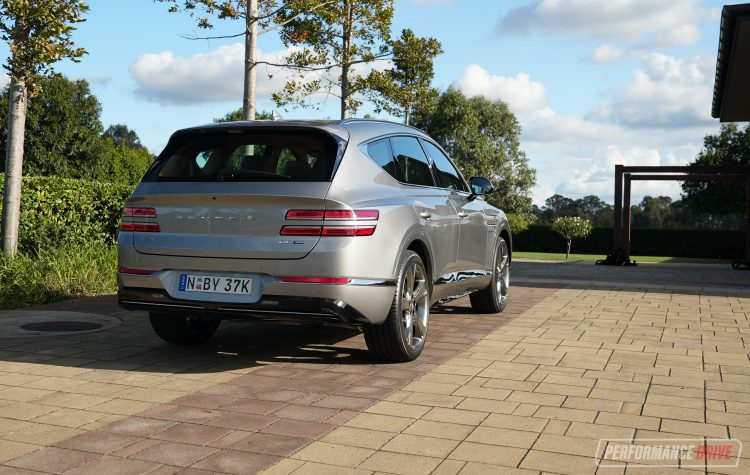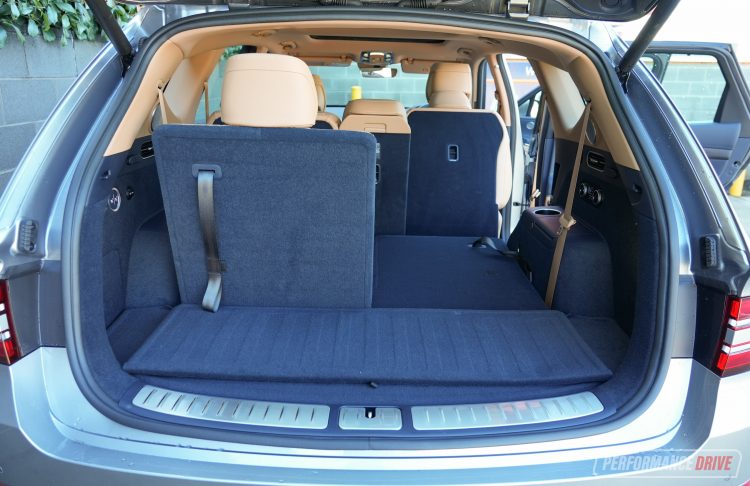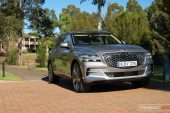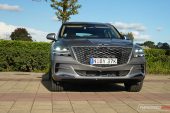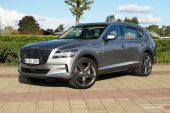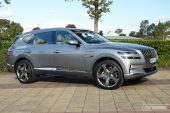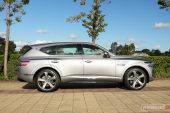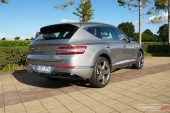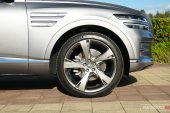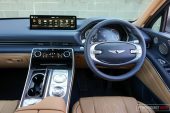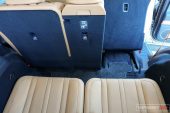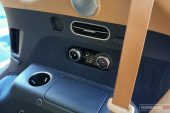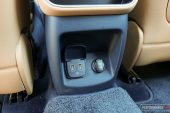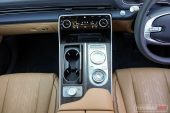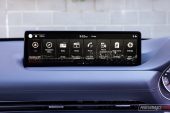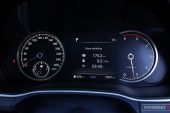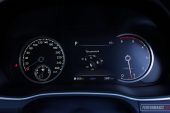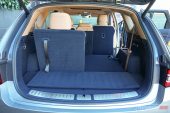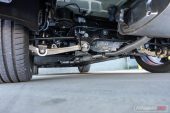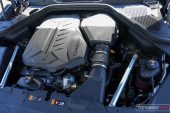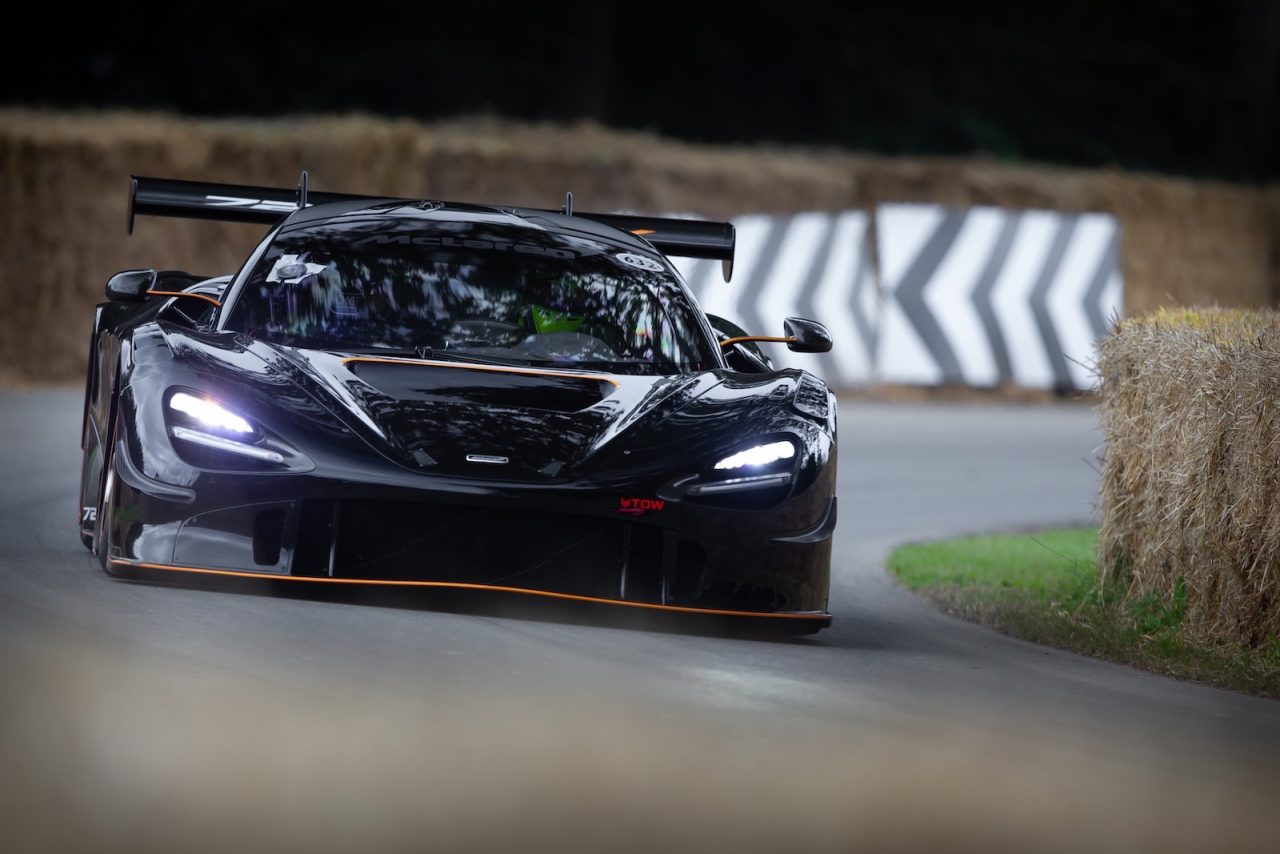Hyundai’s upmarket spinoff brand has released its most important model so far in Australia, the 2021 Genesis GV80. It’s important because it is a large 7-seat SUV; the craze many of us are jumping to these days.
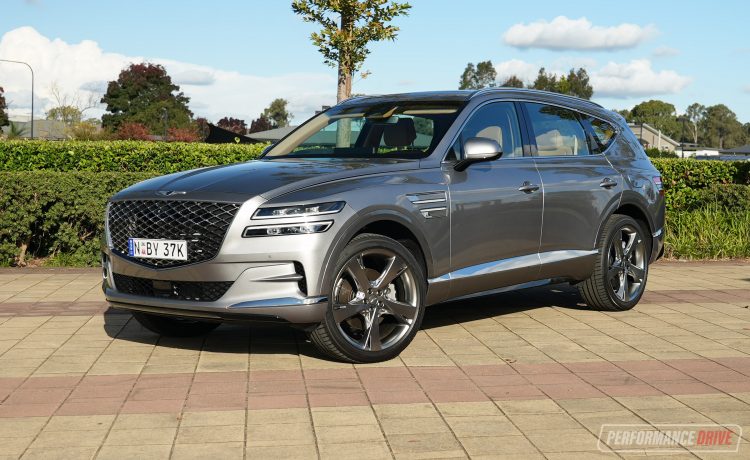
It’s big, bold, and imposing. It threatens other large luxury SUVs like the Audi Q7, BMW X5, and Mercedes-Benz GLE, only it offers more power and more features for less money.
Genesis is generous to its Aussie audience, offering three engine options. You can opt for a 2.5-litre turbo-petrol four-cylinder that outputs a commendable 224kW and 422Nm. It is available in rear- or all-wheel drive. Or, you can get an all-wheel drive, 3.5-litre twin-turbo petrol V6 that boasts 279kW and 530Nm. Additionally, there is a brand-new 3.0L inline-six turbo-diesel engine that powers all wheels, and delivers 204kW and 588Nm (as tested here).
All models are paired to an eight-speed automatic transmission, offer enough seats for seven passengers, and a healthy range of luxury packages and trim colours. Prices commence at $95,600 for the entry 2.5T rear-wheel drive, and rise to $108,600 for the 3.5T. The 3.0D model sits in the middle at $103,60. (All prices exclude on-road costs.)
Genesis has gone to great efforts to create a high-class experience beyond the day of sale. All models are covered by a five-year unlimited kilometre warranty, a free servicing plan for 5 years or 75,000km (or 50,000km on petrol models), 5 years of free road-side assistance, and the “Genesis to You” treatment.
This latter package is where a concierge service will arrange for the pickup and delivery of your GV80 when it is due for scheduled maintenance or warranty services, to your location of choice if you live within 70km driving distance from Sydney, Melbourne or Brisbane CBD. While your vehicle is serviced, a Genesis courtesy vehicle is left with you.
2021 Genesis GV80 3.0D – THE SPECS
[column width=”47%” padding=”6%”]Engine: 3.0-litre turbo-diesel inline-six
Output: 204kW@3800rpm / 588Nm@1500-3000rpm
Transmission: Eight-speed auto
Drive type: All-wheel drive
Wheels: F & R: 22×9.5, 265/40
ANCAP: Five stars
Tare weight: 2267kg
Power-to-weight: 11.11:1 (kg:kW)
Official fuel economy: 8.8L/100km
Economy during test: 8.5L/100km
Fuel capacity/Type: 80L/Diesel[/column] [column width=”47%” padding=”0″]Power efficiency: 23.18kW:L/100km
0-60km/h: 3.11 seconds*
0-100km/h: 6.94 seconds*
60-110km/h: 5.02 seconds*
1/4 mile: 15.03 seconds at 149.8km/h*
Max acceleration: 0.880g
100-0km/h braking: 3.07 seconds at 36.09 metres*
Max deceleration: -1.198g
Decibel at idle: 48*
Peak decibel at 60-100km/h: 76*
Priced from: $103.476[/column][end_columns]
* Figures as tested by PerformanceDrive on the day. Factory claims may be different
2021 Genesis GV80 3.0D – THE PACKAGE
Much of the external design shares the same philosophy with the G80 large sedan. It oozes boldness and elegance. Sheet metal (aluminium for the bonnet and doors) has been kept smooth and free from interruption, with only subtle contours and lines. Up front, there is a prominent chrome crested grille that gives off a stance that you would not want to get in the way of. The right balance of chrome components are used to keep the GV80 stylish without being too loud or tacky.
Thin quad LED headlights look sophisticated, especially with the way their linear shape replicates further along the SUV with dual side gills that embed indicators, and at the rear with long, thin taillights. The rear looks a little overweight with some rear overhang, and those wide taillights and built-in spoiler make it seem even larger.
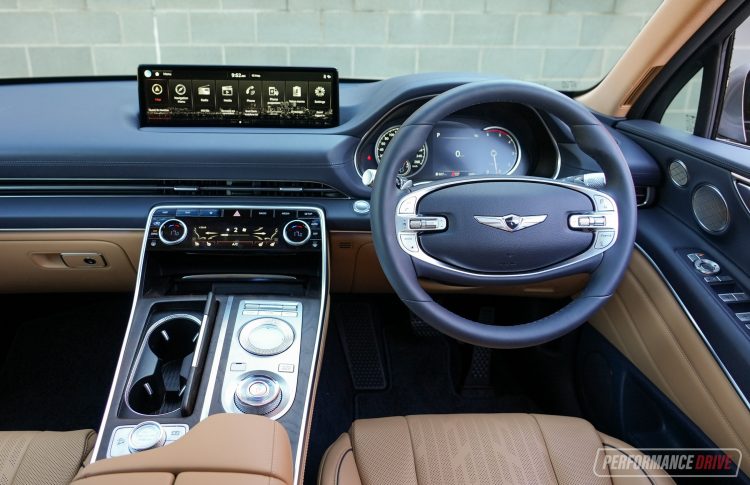
Hopping into the GV80 is like immersing yourself into a world of high-class luxury. You wouldn’t guess you’re sitting in a South Korean-built SUV. Special care has evidently been spent on the interior’s presentation and layout. There is a brilliant combination of brushed metal, plush leather, real open pore wood, and suede. A minimalistic theme is adopted, with elusive air vents integrated into one long unit, neatly contained buttons and controls, and smooth dash contouring.
The centre console rises high for easy reach to the myriad of controls. We love the changeable ambient lighting at night, the huge multimedia touch-screen that measures 14.5 inches, and the quilted leather seats. The only minor callouts we have are the two-spoke steering wheel, as it looks a bit 1980s, and the centre armrest is too hard on your elbow – it needs more cushioning.
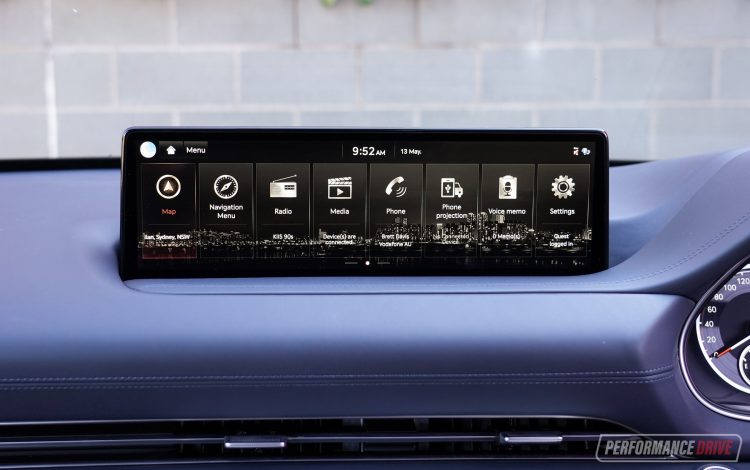
Adding to the prestige is the loads of tech at your fingertips. That crisp 14.5-inch split-able touch-screen can be controlled by a unique rotary touch controller down below. This allows you to draw letters with your finger so you can keep your eyes on the road more. After some practice it is easy and efficient to operate. The multimedia screen also incorporates a new augmented reality turn-by-turn satellite navigation that uses the external cameras to project live pictures into your route. Really cool.
It keeps going with an incredible 12.3-inch 3D instrument cluster (as part of the $10,000 Luxury Package option). We found that adding a third dimension to important gauges, like the speedo, help to speed up your grasp of the live info – and it looks amazingly futuristic. This cluster also doubles up to display a view of both sides of the vehicle when the indicators are activated, via cameras mounted under the side mirrors. There is a touch-type climate control unit with haptic (vibrative) feedback. And finally, a standard 12-inch head-up display projects important info onto the windscreen.
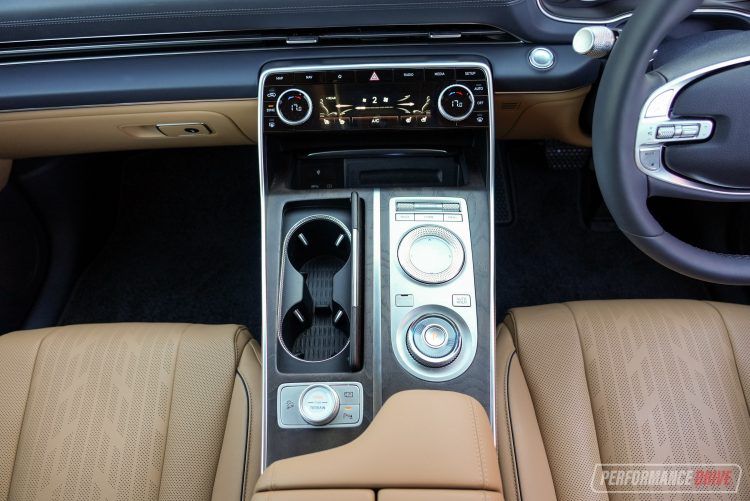
When it comes to convenience and luxuries, the list keeps going. It includes a bass-pumping 21-speaker Lexicon sound system with Apple CarPlay and Android Auto, adaptive cruise control, a power-adjustable steering column, multi-zone climate control, humidity sensor for auto defog air-con, customisable ambient lighting, courtesy and puddle lamps, a glass roof with powered blind, tyre pressure monitoring, a wireless phone charger, and lots more.
Regarding the cabin space, there is copious room to stretch out and chill, whether you’re in the front or second row. The third row is a little more difficult to get in and out of, but it’s ideal for larger families with young kids, or adults on short trips. The first and second rows get the luxury treatment too, with heated and cooled quilted leather with the optional Luxury Package, and electronically adjustable and reclining seats, and charging ports all round.
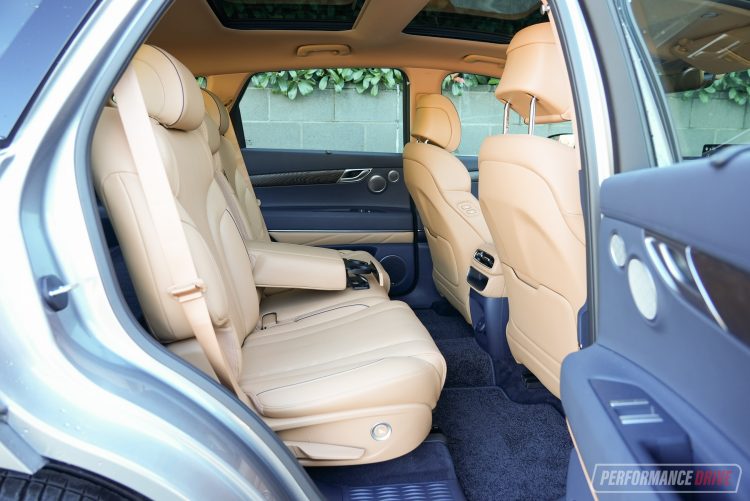
The standard safety suite for all models includes blind-spot sensors with active assist, lane departure warning with active lane-keeping assistance, front-, rear- and side-view cameras, forward and reverse collision mitigation with pedestrian detection, front and rear cross-traffic alert, driver attention detection, and side door exit warning. Nothing important in today’s standards is missed.
In terms of boot space, the GV80 easily lives up to its ‘large SUV’ classification. At 727 litres with the third row folded away, there is an abundance of space for luggage. If more is required, folding the second row increases the space to 2144 litres. Though, the second row doesn’t fold away flat, and the electronically adjustable seat movement is finicky and a slow process.
2021 Genesis GV80 3.0D – THE DRIVE
Even though the GV80 is a hefty 2267kg, getting it moving does not feel like a big effort. The 3.0-litre diesel executes the task confidently and seamlessly. Power for the get-up is rated at a healthy 204kW, which translates to an impressive 0-100km/h claim of 6.8 seconds. Our timing revealed a best of 6.94 seconds. There is also a shipload of torque available. 588Nm makes it feel as strong as a freight train, and it never experiences any shortness of breath. Although peak torque is spread in a fairly narrow range of 1500-3000rpm, there is plenty of grunt outside of this.
What makes the entire power delivery process even better is the silky smooth eight-speed automatic transmission. Yet, it is incredibly fast to transition through the gears. Not to mention instinctive enough to have the most appropriate gear ratio selected before you need it. A real stand out that some competitors should look upon to replicate.
If you have the explicit requirement for an SUV with capable towing credentials, the GV80 is about average in the business, at 2722kg (braked). The Audi Q7 sits on top of the leader board at 3500kg, and the Mercedes-Benz GLE and the BMW X5 diesels both rate at 2700kg.
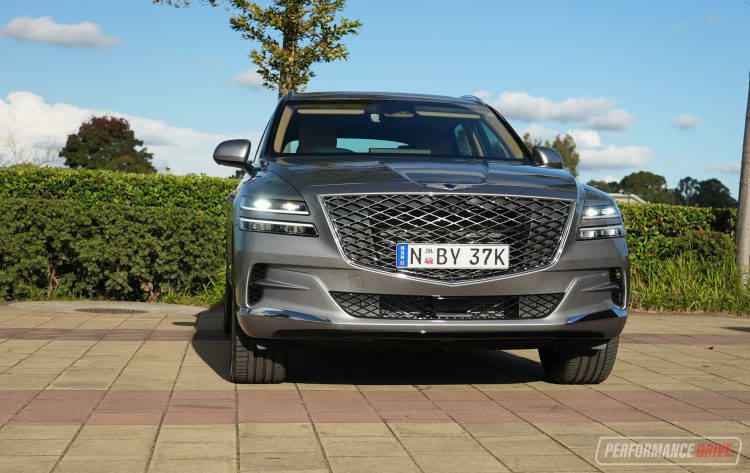
Most owners would not and probably should not take this luxury beast too deep into the bush. But if you do, the GV80 performs well on dirt roads and rough tracks. Thanks to all-wheel drive with selectable driving modes, and electronically adaptive suspension, loose and wet surfaces do not compromise grip, control, or comfort. This adaptive suspension brings all new meaning to the term as it has “Road Preview” cameras to interpret the conditions and road imperfections ahead, and it adjusts accordingly.
Back on the road and the GV80 does not feel as cumbersome as its size suggests. It can electronically adjust quickly to absorb bumps to create a relaxed and luxurious ride. There is a very small tendency for tramlining over larger bumps, probably not helped by the standard 22-inch wheels on the 3.0D. On the highway, little effort is involved to keep it centre in the lane compared to some SUVs this size. There is some body roll, but broad 265/40 Michelin Pilot Sport 4 tyres help the GV80 grip excellently around corners.
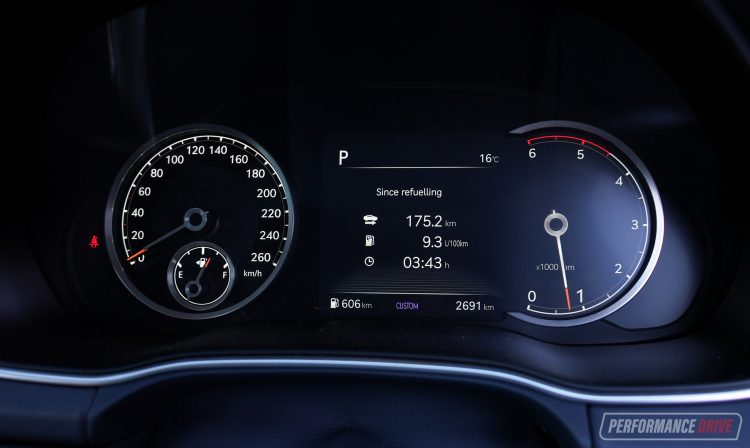
It’s not often the official fuel consumption average of a car is realistic. Let alone worse than a real-world average. The GV80 3.0D officially burns an average of 8.8L/100km. But during our test, which involved a mix of driving styles and conditions over 800km, revealed an average of 8.5L/100km. This is a very reasonable figure to live with considering the amount of power you get, and how heavy the GV80 is. And it achieves this without one of those pesky engine auto start/stop features.
The GV80 introduces a new ‘Active Road Noise Control’ technology. This is where noise from the road surface coming into the vehicle is reduced by using accelerometers and microphones that detect noise in the cabin, and then it uses reverse phase sound waves to cancel out the noise and create a quiet atmosphere. The result is a truly peaceful setting.
2021 Genesis GV80 3.0Di – THE VIDEO
2021 Genesis GV80 3.0D – THE VERDICT
The all-new Genesis GV80 is a solid crack into the large luxury SUV market. We think it achieves everything it sets out to be, offering high levels of luxury, comfort, technology, design, performance, and at a comparatively decent price. It also does this with seven seats and is available with three different engine options.
The only issue we see is in the brand. Most buyers at this end of the market purchase specific brands simply because of the prestige they come with (perceived or not). However, the GV80 leaves a lasting impression in our minds about what a luxury SUV can be. During our time with it, it certainly turned many heads on the streets, too.
[column width=”47%” padding=”6%”]PROS:
– Class-rivalling quality and finish inside
– Clever adaptive dampers work a treat
– Huge 14.5in media interface, sharp graphics
– Loads of passenger and boot space
– Refined 3.0D diesel, with strong power and torque
[/column] [column width=”47%” padding=”0″]CONS:
– Still-establishing brand
– No hybrid or fuel-friendly option
– Weighs over 2200kg[/column][end_columns]
As always, if you’re thinking about buying a new car don’t forget to click here to speak with our car buying specialists.
